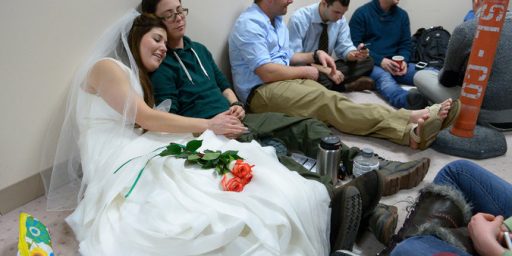Marriage and States’ Rights
Brock Sides proposes the following, simplified version of the marriage amendment:
Nothing in this Constitution shall be construed to require that a state recognize or give legal effect to marriages performed outside that state.
His rationale is that this language doesn’t specifically mention homosexual marriage and it would thus sidestep the bigotry charge. Works for me.
Another alternative would be to simply do away with marriage as a governmental institution, period. Let churches marry people as they see fit–with only religious value attached to the ceremony. We could then have civil unions that the states could regulate. Or perhaps it’s time to simply do away with the institution as a governmental entity altogether. Given no-fault, frequent divorce, serial marriages, the lack of stigma to out-of-wedlock childbirth, and so forth, what’s the need for government sanctioning of a romantic relationship?






Get the state out the marriage business? I think not! being one legally empowered to conduct weddings, and having done quite a few of them, I would turn your point right around: Get the church out of the wedding business.
Weddings were not performed in churches until about 500 years ago. Martin Luther, for example, was not married in a church.
The wedding litanies used by churches today has a lot of God talk but is fundamentally legalistic, not religious. Their source is feudal contract-language from late medieval times, when weddings were nothing but legal contracts between the two families, with property rights of keen interest on all sides.
I think the most appropriate role of pastors such as myself is to conduct a purely religious blessing ceremony/service after the wedding is done (honeymoon need not wait for this, of course!).
It would get pastors out of being agents of the state (all weddings must be recorded with the county clerk, and I sign the certificate) and I think would add dignity to the entire religious end, which can often be sadly lacking unless the pastor forces it, which I have had to do a few times.
You want to know the big mama-jama problem is in this whole marriage debate? Legally, a gay couple can make arrangments for any eventuality that can come along–make out a will, put people on life insurance, put both names on the deed to their house, make out a power of attorney, etc.
What people cannot do is claim spousal Social Security payments for gay partnerships–particularly if there was a heterosexual marriage with children somewhere in the past. ANd claiming SSA money for surviving spouses and dependents is a growth industry for the lawyers–remember the case where a woman conceived with her husband’s frozen sperm after his death and applied to get dependent’s benefits? You think SSA is running out of money now–wait until you open up that can of worms. I can already hear lawyers slavering over the litigation that will come along with this change. Yet another reason to junk SSA and find a new way to handle retirement.
The idea of getting the state out of the business of marriage ignores the fact that the state has a vested interest in marriage. Also, the characterization of marriage as simply a romantic relationship shows your complete lack of understanding about the true purpose and meaning of marriage.
Rev. Sensing hit on it above. Marriage is NOT simply a romantic relationship between two people. It is a contractual obligation between representatives of two families entered into for the express purpose of the survival and perpetuation of families.
Families, by definition, are biologically related, therefore naturally occurring. The moment a child is born into the marriage, both families become one biological entity. It is only the recent advent of and widespread use of contraceptive techniques that obscure this basic biological fact. The purpose and intent of marriage is the perpetuation of families, not the self-fulfillment of individuals.
The reason the state has an interest is that while rights are necessarily vested in the individual, the fundamental natural organizing unit of society is the family. No Society can perpetuate itself by ignoring the preeminent importance of family. It is why we have a whole sub-specialty in the legal field called Family Law.
The biological connection is why homosexual relationships cannot be called marriages. The fact that some heterosexual couples either cannot fulfill the biological imperative because of infertility, or that some heterosexual couples choose to use modern science to circumvent the biological imperative via contraception or abortion does not invalidate the true purpose of marriage.
Whole books, countless articles, and millions of words have been written about the importance of stable families to society. The point of Public Education is to assist families in developing and utilizing future potential. There is a reason our tax laws give preference to families over single people.
No society that neglects the family will survive. If the family breaks down, then the society breaks down. The family is where the transfer of cultural values from one generation to the next takes place. And shared values is the only thing that binds a society together.
Your suggestion displays an all too common ignorance of what marriage is, and why it is vitaly important.
Don: Interesting point. I think of marriage as being one of the religious sacraments.
Scott: I don’t disagree with you as to the theory behind marriage. But we no longer live in the society you describe. Sure, lots of people get married and actually perform those tasks, but it’s out of personal ethics not the institutional pressures. Too great a percentage of marriages are nothing more than being shacked up with a license.
Marriage is a sacrament in the Roman Catholic Church. Pretty sure it is sacrament in the Greek and Eastern Orthodox churches as well. Not a sacrament in any Protestant denomination.
The only sacraments in Protestantism are the Eucharist and baptism. But many P. denominations such as Southern Baptist have no ssacraments at all (they still baptize and commune, just not as sacrament).
Scott — you make good points, but don’t be so snarky!
As a pastor, I agree with Donald Sensing. I’m tired of being a freelance Justice of the Peace. I also feel it’s not a legitmate governmental concern who does or does not participate in a religious ceremony.
It’s sort of weird, though, because my denomination uses a wedding rite which was written in the late 1970s. It’s totally absent the “contract talk” Donald mentioned–there’s no “who gives away this woman?”, no “speak now or forever hold your peace,” not even a “dearly beloved.” You could sit through the ceremony and not get any sense that a legal agreement was being entered into. Perhaps that was even intentional.
As to the issue at hand (the specific amendment), does anybody besides me see a HUGE problem looming–that of having to get remarried every time you moved from one state to another?
Mark,
I think state’s COULD recognize those performed in other states; they just wouldn’t be required to. It would presumably be used to exclude marriages that wouldn’t have been allowed in that state to begin with.
Well, I guess I’m a little cynical about that, James; a revenue stream is a revenue stream, after all . . .
“Sure, lots of people get married and actually perform those tasks, but it’s out of personal ethics not the institutional pressures.”
I completely disagree. Extended families put varying amounts of pressure on the couple to maintain the marriage, especially if children are involved. And ultimately, this is the only pressure that is relevant. The government provides legal framework for breakdowns in this family arrangement, and tries to support an institution on which its very existence depends; but ultimately, marriages existed prior to any government, and will exist after specific governments cease to exist and are replaced by new governments.
The main sticking point is the concept that marriage is a government created institution. It is not. It is not even a religious institution which some like to argue. Rather it is a natural and biological institution created by and for nature. Sexual pleasure and emotional fulfillment are simply nature’s inducements to marriage. Somehow, we have created the concept that the inducements are the purpose. But that is simply not true.
Finally, all societies, indeed all species, are dependent upon natural reproduction for their survival. Marriage is of interest to society and government because without it, society and government would cease to exist.
To lighten up the conversatin a little, there are whole careers of comedians made joking about family relationships and the onerous burden of in-laws. So even in our humor, we acknowledge that families put a demand on marriages.
To wit, the extended families derive benefits from and place demands on the married couple. So once again, the marriage is more about family than it is the exclusive relationship between two individuals. Perhaps if more families realized this, they would act quicker to intervene when problems arise in marriages and help them survive.
Writing this in a hurry, so please excuse the grammar. SCOTT: It does not matter what the purpose of marriage is for. That is a matter of opinion. What is under concern is a matter of law. Lots of things are used for purposes other than their original, and that is fine. Marriage may have BEEN a biological continuum process, but now it is a matter of contract and fidelity. That is why we do not honor bigamy (which would definitely promote procreation and biological continuum) and do not have a culture in which we arrange marriages as a social norm. The concept of marriage now is one of choice–people can opt in or opt out as they see fit. It is the person’s RIGHT to decide who they wish to marry–no court can force a marriage. That choice can take any form, and none of these have to do anything with biological continuum or procreation. Infertile people can marry, gay men can marry straight women, and TRANSGENDERED SEXES CAN MARRY THE NOW OPPOSITE SEX. People can marry for money and never have children. If the legal purpose of marriage was biological continuum, then there would be a law requiring children after marriage. That of, course, is ludicrous, because it is the freedom and right of the people to marry for whatever reason they wish (unless they are specifically trying to help someone gains citizenship). On the citizenship issue, there is monitoring by the state to check to see if the marriage is, indeed, “genuine.” The questions on these questionnaire’s are not biological, but commitment and knowledge and fidelity-oriented. This is showing that we are not still stuck in the biological continuum times of the anglo-saxon middle-ages, marriage now is about LOVE (ideally anyway) and INDIVIDUAL CHOICE. The issue of what marriage WAS transferring to what marriage SHOULD be is moot and irrelevant. Marriage has progressed, isn’t it time you progress, too?